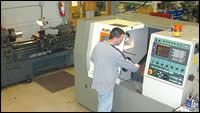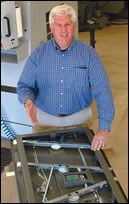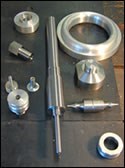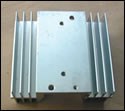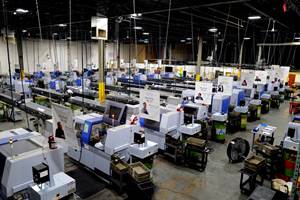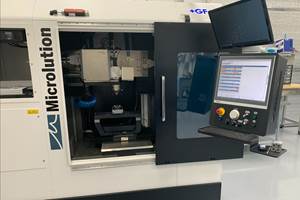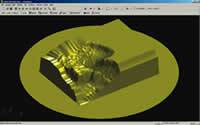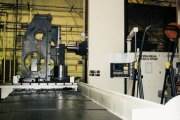Provide A Service, Then Make The Part
The way this shop serves its customers brings in machining work by design.
Share





You've seen the air tanks that firefighters wear on their backs. Those tanks used to be made exclusively from steel, but newer and lighter-weight versions combine aluminum and composite fiber. A company producing these lightweight tanks needed custom-designed ovens for curing the composite more efficiently, but that company had no machine-design capability in-house. Because it wasn't core to the company's business, such expertise had long ago been trimmed away. The company had no machine-making capability, either.
So design engineer Tom Armfield took on the work of designing these ovens. Along the way, he also secured a substantial amount of machining work for his own company, MasterWorks Machining of Taneytown, Maryland. MasterWorks is not just an engineering contractor but also a job shop, and these ovens required a sizable number of machined parts.
Another example of how the shop has secured machining work by design relates to safes. The company was hired to design, and then manufacture, a specialized safe equipped with a cooling system that could house a live computer. Embassies and government agencies are among the potential buyers of a safe like this. Mr. Armfield's first design simply involved modifying an existing safe from a well-known safe company. He bought the safes and made the modifications. Today these modified safes are still being made and sold, but the safe maker can no longer keep up with the demand. So to close the gap, MasterWorks will soon begin to supplement these modified safes with safes made from the shop's own design, and built up from its own machined parts.
As aggressive shops find ways to take on larger roles in their customers' processes, contract machine shops are increasingly becoming contract manufacturers. Often the larger role for these shops combines machining with some downstream operation such as assembly. But Mr. Armfield, with his background as a design engineer, is able to look upstream instead. Young companies often lack engineering resources, and today there are many long-standing companies that have eliminated the buffer of engineering capability that might once have served a company's own internal needs. These same companies are just as likely to lack machining capability. So when MasterWorks is able to help companies by providing engineering services, it often wins an inside track to obtaining any related machining work as well. In most cases, MasterWorks is so clearly the logical choice to perform the machining that the shop is freed from having to submit to competitive bidding.
Mr. Armfield can even design a product to make it as easy as possible for his own shop to produce. This is an advantage that few shops enjoy. The new safe design, for example, benefits from "design for manufacturing" in perhaps the most basic way imaginable. When the design was created, MasterWorks had CNC turning capability but not a CNC machining center. (Today that's no longer true.) Recognizing that a CNC lathe was the most productive machine tool in his shop, Mr. Armfield designed various components of the safe to be round instead of square.
Making Fixes
MasterWorks was founded 6 years ago in a three-car garage, where Mr. Armfield and one employee worked at manual machine tools. The company is still small today, but it has grown by multiples since that time. While other machine shops were shutting their doors or shrinking during recent years, MasterWorks' annual sales either held steady or grew. Today, there are 12 employees in a 6,500-square-foot facility.
Providing an engineering service as a prerequisite for getting machining work has always been part of this company's approach. Some of the early work for the company involved repairing out-of-spec parts that had been made in China. The shop's use of manual machines didn't compromise efficiency here, because individual workpieces demanded different repairs. The company's job was not just to fix the parts, but also to report on the problems and recommend changes to either the design or the production process that would overcome these errors. In at least one case, increasing a wall thickness on a component provided for a more generous tolerance band around an error-prone hole. In other cases, the customer concluded that the part could not be machined effectively using the Chinese facilities to which it had access. MasterWorks was allowed to produce this part on its own.
In time, the number of customers increased from a couple to several, and some of the small runs of parts opened doors to larger runs. Mr. Armfield had never managed a production machine shop before. Now, he had to teach his staff—and teach himself—some of the lessons that long-standing machine shops know by heart.
One lesson related to scheduling. Even when the volume of work increased, customers' tight leadtimes kept the shop to the same 2- or 3-week buffer of work that has been the only cushion the shop has enjoyed for most of its time in business. The larger number of jobs competed to get done within the same amount of time. Scheduling used to be done informally, but now the staff has to have regular meetings to organize and prioritize the work.
Other disciplines the shop had to develop related to quality. Though the shop built a reputation on its ability to deliver close-tolerance work (one batch of precision parts was necessary for a NASA mission), the ability to deliver the same quality work again and again proved to be a challenge of a different sort. After some early missteps that the shop was quick to address, the company worked out procedures aimed at keeping its quality not only high, but also consistent.
Machine Requirements
Maintaining consistency in close-tolerance work was what drove the shop to purchase its first CNC machine, a chucker lathe from Fortune International of Somerset, New Jersey. The customer sending work to China was prepared to give MasterWorks an order for a small and very precise CNC-turned part that the customer would order again in small batches on a recurring basis. This part didn't call for milling or cross work, so no Swiss-type or multitasking lathe was needed. However, it did require nearly all of its features to meet tolerances of a few ten-thousandths of an inch.
MasterWorks' requirements for a CNC lathe to do this work included: 1) sufficient repeatability to make it easy to produce this part consistently; 2) a small footprint, to make it easy to fit the machine in the shop; and 3) service technicians located no farther from the shop than 2 hours' drive away.
For a time, this lathe was the only CNC machine in the shop. Mr. Armfield now acknowledges that this period of time went on too long. For milling and drilling work, the shop relied on knee mills offering simple programmability through digital readouts. But those machines cost the company money by virtue of the productivity the shop lost by not having a machining center available.
The machining center the shop finally did purchase came from Milltronics Manufacturing Co. of Waconia, Minnesota. Even when the price of this machine is combined with that of CAM software for programming it, Mr. Armfield says, the cost is cheap relative to the extra output it delivers over the more basic equipment.
These machines have allowed the shop take on other jobs that are poor candidates for foreign outsourcing. In general, these jobs involve closer-tolerance parts that are ordered in quantities of hundreds or thousands per year, not tens of thousands.
But frequently enough, the machines are simply used to run one-time orders at small prices whose chief value is to keep alive a relationship that might lead to further engineering work. The shop's most rewarding machining relates to parts that are made from the company's own designs.
The computer safes provide a striking example. Today, there is a 9-month backlog of orders for the modified and/or custom-designed safe models. Such a backlog is a far cry from the 2- or 3-week buffer that is typical of the shop's more traditional contract machining.
Related Content
Inside the Premium Machine Shop Making Fasteners
AMPG can’t help but take risks — its management doesn’t know how to run machines. But these risks have enabled it to become a runaway success in its market.
Read MoreHow to Determine the Currently Active Work Offset Number
Determining the currently active work offset number is practical when the program zero point is changing between workpieces in a production run.
Read MoreWhere Micro-Laser Machining Is the Focus
A company that was once a consulting firm has become a successful micro-laser machine shop producing complex parts and features that most traditional CNC shops cannot machine.
Read MoreThe Future of High Feed Milling in Modern Manufacturing
Achieve higher metal removal rates and enhanced predictability with ISCAR’s advanced high-feed milling tools — optimized for today’s competitive global market.
Read MoreRead Next
You Can Automate More Than You Think
This shop expedites 3D milling work by reducing its dependence on employees for all of the information-related tasks that occur before the machining center can start to cut.
Read MoreNot Your Typical Job Shop
This family-owned job shop has developed an integrated fabrication and machine shop in order to satisfy customers' changing needs. In doing so it has become an example that other shops might want to imitate.
Read MoreRegistration Now Open for the Precision Machining Technology Show (PMTS) 2025
The precision machining industry’s premier event returns to Cleveland, OH, April 1-3.
Read More












